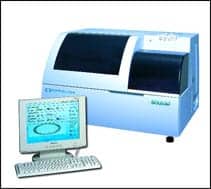Carolina Liquid Chemistries Corp (CLC), Greensboro, NC, has recently added the PLAC test for Lp-PLA2 activity from Diazyme, Poway, Calif, to its extensive menu of reagents for use on clinical chemistry analyzers. The test is an enzyme assay for the in vitro quantitative determination of lipoprotein-associated phospholipase A2 (Lp-PLA2) activity in human serum or plasma.
The company’s new offering is the only blood test cleared by FDA for use in conjunction with clinical evaluation and patient risk assessment as an aid in predicting the risk of coronary heart disease (CHD) in patients with no prior history of cardiovascular events. Most clinical laboratories can now perform this test, as it can be run on clinical chemistry analyzers along with lipid profiles and other tests.
Lp-PLA2 is a vascular-specific inflammatory marker that detects rupture-prone plaque. The greater the Lp-PLA2 activity, the greater the risk for fatal and nonfatal CHD events. In studies, the PLAC activity test has been shown to have a strong association with CHD events, as compared to traditional risk factors, even after adjusting for age, gender, race, diabetes, and smoking status. The absolute risk of CHD events is 2.1 times greater with a positive PLAC test. Only complex clinical conditions such as diabetes and smoking status demonstrated greater hazard ratios for CHD events.
CLC is a privately held, veteran-owned, ISO-certified diagnostic company and an FDA-registered manufacturer, repackager, and relabeler. For 20 years, CLC has provided laboratories worldwide with high-quality clinical chemistry instruments and reagents as a single source for products, installation, training, and service.
To learn more, visit Carolina Liquid Chemistries.





